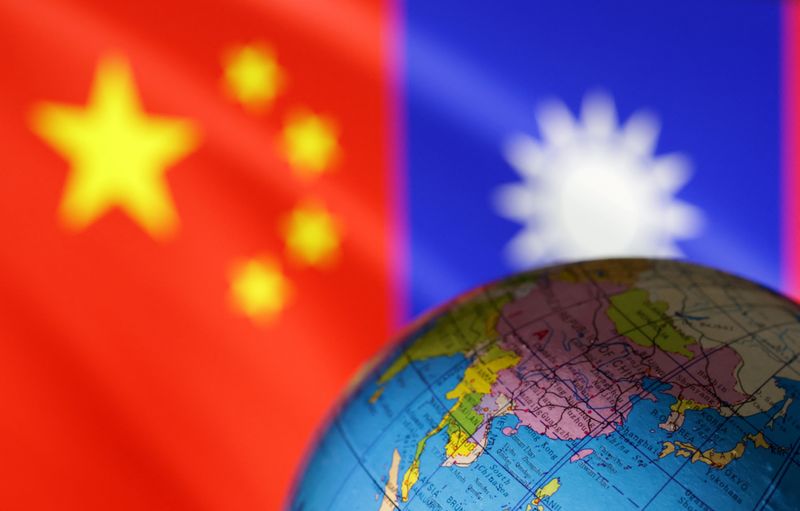Written by Anthony Slodkowski and James Pomfret
BEIJING/HONG KONG (Reuters) – The U.S. government has for years urged China to exercise “restraint” in pushing its claims to Taiwan and abandon military threats to bring the democratically-ruled island under its control.
Now – some Chinese commentators say – the force of that long-standing US message has been undermined by US President-elect Donald Trump’s threats to seize control of Greenland and the Panama Canal, by force if necessary. Trump takes office on January 20.
The implications of Trump’s comments on US policy toward Taiwan have been widely discussed on Chinese social media platforms in recent days and by foreign policy analysts.
While nothing is likely to change in the military standoff over Taiwan in the near term, some say Trump’s departure from the norms of American diplomacy could create an opportunity for China.
One Chinese expert said Trump’s first term in office indicated that he viewed foreign policy as transactional in nature, and suggested that he might be amenable to a deal on Taiwan.
Zhao Minghao, a professor at the Institute of International Studies at Fudan University in Shanghai, said Trump’s threats to seize Greenland, the Panama Canal and even Canada should be taken seriously.
“Besides that, we need to think about Trump’s transactionalism, which he is also serious about. Many in China still view Trump as a deal maker, even on very difficult issues like the Taiwan question,” he said.
The Chinese Foreign Ministry said it was “absurd” to try to link Greenland’s status to Taiwan.
“The Taiwan issue is an internal Chinese matter, and how to resolve it is a matter for the Chinese people,” she said in a statement sent to Reuters.
Asked whether Trump’s comments could provide impetus for China to raise trouble over Taiwan, Taiwan’s Foreign Ministry said the Republic of China, the island’s official name, is a “sovereign and independent country.”
“Any distortion of Taiwan’s sovereign status will not change the status quo in the Taiwan Strait,” she said in a statement.
Trump’s transition team did not immediately respond to a request for comment.
China insists that Taiwan is part of its territory and has never renounced the use of force to bring the island under its control.
The limiting factor for Beijing is that the United States is legally obligated to provide Taiwan with the means to defend itself, although whether US forces would come to Taiwan’s aid in the event of a war with China is unclear under the policy of “strategic ambiguity.” .
Trump provided strong support for Taiwan, including regulating arms sales, during his first term. But during his election campaign last year, Trump said Taiwan should pay the United States to defend it. Taiwan has repeatedly said it is committed to increasing its defense spending.
To be sure, the Taiwan question is very different from the positions in Greenland, Canada, or the Panama Canal: in China’s eyes, Taiwan is already legally Chinese territory and destined to be “returned to the motherland.” Taiwan rejects these allegations.
However, Trump’s comments about Greenland caused an uproar on Chinese social media, which is subject to censorship.
“If the US annexes Greenland, China should seize Taiwan,” Wang Jianjiu, a law professor at the City University of Hong Kong, wrote on the microblogging site Weibo (NASDAQ:).
One commenter on a blog run by Chinese search engine Baidu (NASDAQ:) said that if Trump moves on Greenland, China should “seize the opportunity to take back Taiwan.”
“Trump seems serious, so we should also see what we can get from this,” the person writing as Hongtu Shuming wrote.
Chen Fei, an associate professor at the School of Politics and International Studies at Central University of China, wrote on Chinese news portal NetEase (NASDAQ:) that just like Greenland was for Trump, Taiwan was a core security interest for China.
He added that the two issues are not the same thing, because what Trump is doing is a direct threat to the sovereignty of another country.
“Taiwan is China’s core territory and a purely internal Chinese matter. It has nothing to do with the sovereignty of another country.”
However, for Chinese President Xi Jinping, other factors carry more weight, especially his assessment of the country’s military capabilities and the potential costs China would incur if it did so, said Bonnie Glaser, an expert on Taiwan at the German Marshall Fund of the United States. Force was used against Taiwan.
“I doubt Beijing will make a comparison between Greenland and Taiwan,” she said. “The Chinese believe that Taiwan already has been and always will be part of China – they will not pay money for it and no government in Taiwan will agree to buy it.”
Drew Thompson, a senior fellow at S.C. College, said: Rajaratnam of International Studies in Singapore and a former US Defense Department official, said it was “completely unreasonable” to think that Trump’s comments on Greenland could encourage China’s claims over Taiwan.

He added, “But what amazes me is that if President Trump… refuses to rule out the use of military force to achieve and protect American interests, I believe that this kind of statement and determination would serve to further deter Beijing from taking any action that would exacerbate these… “The problem.” “It prompted the United States to take military action to protect Taiwan.”
“This is a very strong deterrent for China.”
https://i-invdn-com.investing.com/news/world_news_2_69x52._800x533_L_1419494365.jpg
Source link